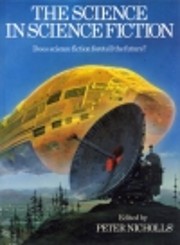

Auf ein Miniaturbild klicken, um zu Google Books zu gelangen.
|
Lädt ... The Science in Science Fictionvon Peter Nicholls
 Keine Keine aktuelle Diskussion zu diesem Buch. Zeige 2 von 2 keine Rezensionen | Rezension hinzufügen
Bemerkenswerte Listen
Presents some of the interesting true and false predictions of science fiction, including space travel, extraplanetary life, weaponry, telepathy, etc. Keine Bibliotheksbeschreibungen gefunden.
|
Aktuelle DiskussionenKeineBeliebte Umschlagbilder
 Google Books — Lädt ... Google Books — Lädt ...GenresMelvil Decimal System (DDC)500Natural sciences and mathematics General Science General ScienceKlassifikation der Library of Congress [LCC] (USA)BewertungDurchschnitt: (3.77) (3.77)
Bist das du?Werde ein LibraryThing-Autor. |
||||||||||||||||||||||||||||||||||||||||||||||||||||||||||||||||||||||||||||||||||||||||||||||||||||||||||||||||||||||||||||||||||
The answer was - quite a lot. Indeed, I had thought to make this review a tabulation of the areas where we now knew better, but by the time I was a third of the way into the book, I realised that such an approach would be a) extensive, and b) a bit petty. There is little that is laugh-out-loud wrong; mostly, the areas where the book fails is in statements like "Researchers hope that X might be possible within 50 years" and in my response along the lines of "Yes, I've got one just like it in my kitchen."
The only time I rang up a 100% cast-iron WRONG! was in a segment talking about computing, which described 1946's ENIAC as "the world's first functional electronic computer". But none of the writers could have known about the British World War 2 codebreaking computer COLOSSUS, because at that time, its existence remained the UK's best-kept secret, even though Churchill ordered its destruction and purging from the records at the wars end.
There are ten chapters covering the major themes of sf; then a chapter on 'mysteries' (flying saucers, ancient astronauts, vanished civilizations and so on); and finally a chapter on where sf got it wrong. Much of the book is actually perfectly serviceable; little of the science has been entirely superseded by the developments of the last forty years, though it spends time discussing the coming Ice Age and hopes that anthropogenic environmental warming might help offset some of that. Perhaps the things that date the book the most are the examples: many of the sf writers cited are Golden Age authors, Star Trek only consisted of the three seasons of the original show, Star Wars had a sequel but had not yet become a global phenomenon, and global terrorism barely merits a mention as a possible future horror. Perhaps the thing about the book that dates it the worst are the graphic design and the choice of illustrations.
The whole thing is quite readable, and the book is worth acquiring if you see a copy on sale. But the reader should keep an open internet connection (itself something suggested in this book) and a large notepad to jot down the areas where we have advanced since 1982. There will be plenty of them. (